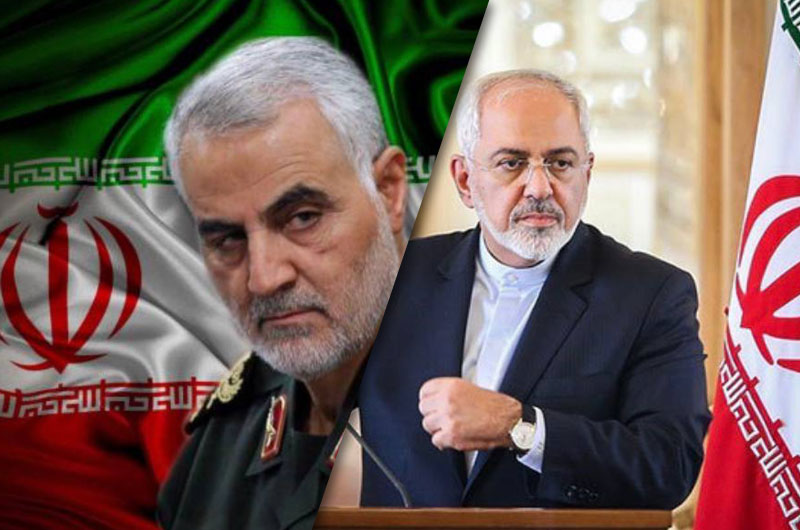Peace Diplomacy Sacrificed by Internal and External Saboteurs
Two strange events in the US on the verge of finalizing the JCPOA negotiations: the arrest of a suspect accused of planning to assassinate John Bolton, former national security advisor to Trump, and the attack on Salman Rushdie, the author of ‘The Satanic Verses’. These events are either the work of internal profiteers from sanctions or external ones, or they are the actions of internal saboteurs, or it is the handiwork of the Israeli lobby and their security services and supporters.
The accusation against an Iranian in the case of planning to assassinate Bolton has been met with denial by Iranian officials and even media activists and supporters of the current power within Iran and on social media. However, in contrast, the assassination of Salman Rushdie has caused a wave of joy, at least among some of the media body of this current.
Some have reposted the image of Mustafa Mazeh, a member of Hezbollah Lebanon who acted to kill Salman Rushdie after Ayatollah Khomeini’s fatwa declaring Rushdie an apostate, but was killed while planting a bomb in a hotel in London. They have now recalled his failed attempt and sent greetings to his spirit. The recent assassination suspect is also a Lebanese, and now again, on the brink of the negotiations’ conclusion, fingers are pointed at Iran.
If it is the work of external saboteurs
The issue could have another dimension, which is that these operations might have been orchestrated by opponents and anti-JCPOA elements outside of Iran, such as the Israeli lobby. Israel has repeatedly expressed its opposition to the JCPOA and stated that it will have no commitment to its revival. The Israeli Prime Minister explicitly stated that his country would not be bound by what is written in the potential agreement and would continue to act freely wherever and whenever without any conditions.
Reza Nasri, an international affairs analyst and university professor, writes: ‘Watch how the Israeli lobby and JCPOA opponents will associate the attack on Salman Rushdie with Iran and then the nuclear agreement. It is entirely possible that the recent plots against Alinejad, Bolton, and now Rushdie, have been organized by the Israeli intelligence system to undermine diplomacy.’ Marandi, an advisor to the Iranian nuclear team, also wrote on his Twitter: ‘I won’t shed a tear for someone who spread hatred against Islam and Muslims for years.’
But isn’t it strange that just as we are on the brink of reviving the nuclear agreement, the US raises the claim of Bolton’s assassination, and then such an incident as the attack on Rushdie occurs? Abbas Abdi, a journalist and political analyst, also wrote: ‘I am not a conspiracy theorist, but the coincidence of the news about the plan to assassinate Bolton and the assassination of Salman Rushdie with the finalization of the JCPOA talks is unbelievable to me.’
Last March, when Iran and the negotiating parties were close to reaching an agreement, the Israeli war minister claimed that whether this happens or not, Israel will continue to do anything to prevent Iran from becoming a significant threat and acquiring nuclear capability. Iranian officials have repeatedly stated that Israel does not want the JCPOA.
Amirabdollahian, the foreign minister of Raisi’s government, stated that the Israelis do not want the JCPOA revival, saying that they lie to the world about Iran seeking nuclear weapons. The foreign ministry spokesperson also previously tweeted that the Israeli regime, whose existence depends on tension, has once again taken action and is blowing the horn of lies to poison the Vienna negotiations.
If it is the work of internal saboteurs
It is clear that there is a faction inside, possibly with supporters outside, that does not want the JCPOA to be concluded. This probably has nothing to do with this or that government because it is more about economic interests than political ones.
The story of diplomacy being taken to the slaughterhouse by the field was previously extensively explained by former foreign minister Mohammad Javad Zarif in a leaked audio file. Zarif said there that almost every time he went to negotiate, it was Soleimani who would say, ‘I want you to take this feature, take that point.’ I would go to negotiate for the success of the fieldwork, but when I would say to him, for example, not to use the Iran Air plane on the Tehran-Syria line, Qasem Soleimani would not comply.
Thus, diplomacy became the cost of the field, but the field never became the cost of diplomacy. Is diplomacy still being sacrificed for the field? When Antony Blinken, the US Secretary of State, in response to the revelation of the failed plot to assassinate John Bolton, which allegedly involved an Iranian member of the Quds Force, stated that any aggression and threat against American officials by military forces or their affiliates on US soil would have severe consequences. Will the result be anything other than that diplomacy is once again being sacrificed for the field?
Factions that have become accustomed over years of sanctions to earning vast incomes through establishing trust companies and operating in an underground economy without any accountability or transparency are certainly opposed to the JCPOA revival. As the JCPOA revival would lead to transparency in international transactions and entering the glass room, it is in stark contrast to their interests.
If these two assassinations are directly or indirectly related to the saboteurs, whether internal or external, it is undoubtedly a gift to the hardliners residing in the Congress and Senate building to try to pressure American negotiators through their media. Considering that the issue of removing the IRGC from the terrorist list is one of the most critical points of contention between Iran and the American side, these two events are precisely in line with their demands and proving the validity of their claims.

